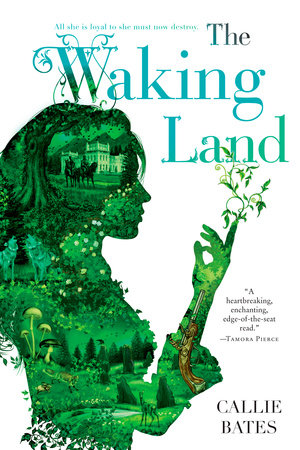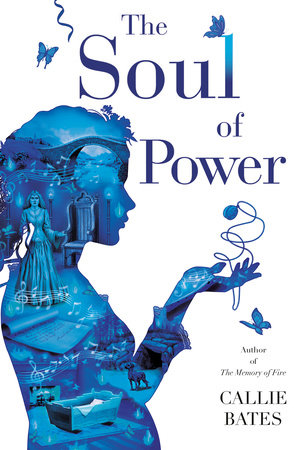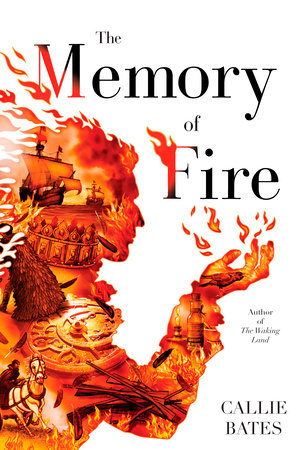Excerpt
The Waking Land
Chapter One
It’s been fourteen years, last night. Fourteen years since King Antoine took me hostage; fourteen years since I’ve seen or heard from my parents. It’s the only night I allow myself to remember them, and the only night I dare to look my fear in the eyes and remember why I’m here. And as usual on this night, I haven’t slept at all.
I dress in the dark, dragging breeches over last night’s silk stockings. Beyond the wooden paneling separating my bedroom from the alcove, Hensey snores. I wish she’d sleep in the servants’ quarters, but she protests that I still need her, even though it’s been fourteen years and, most nights, I sleep without fear.
I pull my weathered greatcoat over a shirt and waistcoat, tugging its wool collar up high. I look nothing like a boy, but this early no one will look past the bulk of my clothes to see my face. Through the mullioned windows, a gray light penetrates the gloom, revealing the strip of garden beyond the palace. I can’t see the drive well from here, but most of the coaches seem to have gone. Eren’s courtiers have finished their celebration—not that I stayed to toast Princess Loyce and her favorites, especially after she mocked the trailing silk vines and embroidered flowers wound into my hair. “Lady Elanna, you seem to have a plant growing out of your head,” she crowed. “Have you potting soil there as well? Caerisians! You can never get them out of the dirt. Like hogs.” I didn’t answer her, even though she made me flush with anger; it never does any good to respond to her jabs.
Denis Falconier, her favorite, answered instead. “Why, don’t you know that the earth is alive, according to the Caerisians? That’s why they’re always dirty. Rolling about in the dirt. Making love in it.” He smirked and Loyce laughed and, because she laughed, so did almost everyone else.
Sometimes I think Loyce would be less cruel without Denis goading her on. But maybe he just says what she’s already thinking.
We had a gathering in the Diamond Salon instead, my best friend, Victoire, and I—leading the celebration with the latest gossip from Ida, drinking sweet mead, and laughing. Even the king joined us for a brief time, our disagreement the other day forgotten as we talked about my latest botanical work. I don’t think he’s actually angry; he wants to protect me. I’m almost as much a daughter to him as the princess is—more, maybe. Antoine takes an interest in my work and life, and he’s always generous, though I ask for little. Maybe that’s why he’s so kind to me. Loyce is always demanding more things: new gowns, a better chef, a larger allowance, a new jewel she’ll wear once and forget.
Strange to think of him holding a pistol to my head when I was five years old.
I carry my boots out into the corridor before putting them on. Hensey doesn’t wake.
I take the side door that slips out below my rooms and head down the maids’ stair, out into the vegetable garden. A dim racket echoes from the kitchen. I make my way, unseen, along the hedge to the gate, and out onto Laon’s cobblestone streets. The city lies quiet around me—the whole kingdom of Eren lingers under the spell of good food and wine. The people who have food, anyway. Not those who clamor at the palace gates and are set upon by the palace guard, claiming that King Antoine Eyrlai has stolen their grain for his own bread.
But even the poor aren’t out scavenging after last night’s celebration. The brisk autumn air is sharp in my lungs as I approach the Hill of the Imperishable. The ground steepens and the elms and oaks cluster together, dense with undergrowth. A trickle of birdsong fills the air.
The great old circle of stones sits silent on the hilltop, overlooking the river and the Tower on its distant hill, lit by a burning autumn sun. No one else ever comes up here. They’re afraid someone will accuse them of practicing magic, that they’ll be seized and interrogated by witch hunters. When they invaded our lands centuries ago, the emperors of Paladis called our stones nests of witchcraft. They couldn’t drag the stones out of the earth, so they set up guards to kill anyone who came up here, sorcerer or no. The imperial army’s two hundred years gone, the empire’s shrunk due to corruption within, and Eren is the empire’s ally now, not her subject. But the fear still lingers. After all, though the inquisitions have ended, some people still practice magic, and witch hunters still capture and imprison them.
I ought to be afraid, too. But no one’s watching me—not this morning, nor any morning. I haven’t been under guard since I was five years old, once I proved myself a tame hostage.
So there is no one to see me taunt myself with the magic I cannot have.
I stride to the center of the circle, where a flat stone lies buried halfway into the earth. I drop down onto its cold surface. The chill seeps up through my greatcoat and breeches. There was a stone circle in Caeris, I think, that I visited as a child. I seem to remember my father taking my hand in his. People singing while he cut a gentle drop of blood from my palm and let it fall to the stone at my feet.
But maybe I’m imagining it. Maybe I’m inventing what happened when the stone drank my blood. I was just a child; what do I truly remember?
I slip the dagger out of my pocket, balance it in one hand, and throw it into the circle instead. It clatters off the closest stone, loud in the empty morning. Would my mother scold me for doing this? Would she call it disrespectful, sacrilegious? The savage gods they still worship in Caeris, the gods Denis Falconier mocked—the old gods of earth and wood and mountain, not the civilized deities we’ve adopted from Paladis—would not approve.
I don’t remember what my mother looks like. But when I throw the dagger, I remember the warmth of her hand on my wrist, stopping me.
Or maybe it’s just my imagination.
I snatch up the dagger and hurl it at another stone. What’s the use in thinking of my mother or father? I’m glad they never tried to rescue me; I’m glad I didn’t grow up a scrawny, backwoods Caerisian rebel, speaking in a wretched accent and hating the crown. The Caerisians are shepherds, cattle-raiders, fishermen, poor farmers tilling rocky soil; they’ve scarcely heard of Paladis and the philosophers of Ida. Caeris itself has hardly changed since the conquest two centuries ago, still a land of drunk, querulous half-savages. They’re so disorganized that it took the Ereni one day to overtake their capital during the conquest. Think how easily Antoine put down my father’s foolhardy rebellion! By capturing me, he stopped the rebellion and destroyed my father’s hopes for a new king in a single stroke. Imagine what it would have been like if the Caerisians had succeeded! Would we be speaking their barbaric language now, expected to practice their backward customs, bowing to the Old Pretender instead of Antoine? The entire world, and not just Denis Falconier, would deride us as earth-worshipping pigs.
Thank all the gods I live at the court in Laon, where I have friends and my work in the greenhouse, salons and theater and dancing—the sophistication that the north can’t even conceive. Thank all the gods Antoine put a stop to a rebellion that wouldn’t have benefited anybody except my father, the man who fancies himself a kingmaker. King-mocker, more like.
I start toward the dagger—my throw went wide, landing between two of the toothy stones—and feel a warm trickle between my fingers. I must have cut myself picking up the dagger that first time, because jewel-red blood shines on my finger-pads. It doesn’t hurt, but still a shiver runs through me and I look at the stones. With the light burning behind them, and their shapes throwing shadows on the ground, they seem almost as if they could shift shape—or move.
“Don’t you dare,” I say to them. I start toward the dagger but instead pause by the nearest stone. It is squat, with a small bulge on top, like a head over a square body.
I only come up here once a year, on this day. When I was twelve, Hensey caught me sneaking back in. She saw the cuts on my hands. “What have you been doing?” she demanded. I stuttered something about the Hill of the Imperishable, about what happened when my blood touched the stones—even though I knew I shouldn’t tell anyone, not even her. I knew it must be kept, a terrible secret.
“That’s witchcraft, El.” Hensey buried my face in her bosom as if she could smother the magic out of me. “Anyone sees you doing that, you know what will happen? The witch hunters will come for you. First they’ll use their witch stones to send you mad. Then they’ll strip everything you know from your mind. When they kill you after that, it’ll be a mercy.”
For months after, I had nightmares about the witch hunters coming to haul me away to a prison in Ida. Then the nightmares faded; my tutors taught me that, while magic is considered anathema, in truth it simply has no place in the rational, modern world. They said that the Paladisan emperors have made the empire and its former subject states a safer place with their inquisitions and their witch hunts, which not only cleansed our lands but purified the heart of the empire itself. For a while, even I thought we should celebrate the inquisitions that made our world a safer place.
But then the Harvest Feast came around again and I sneaked back up here. I dropped my blood on the stones. Just one morning, I promised myself, just one morning, once a year.
Hensey’s never caught me again, and I’ve grown better at sneaking out.
I stretch my hand out toward the stone, my breath stilled in my throat. No, I shouldn’t do this. The risk is too great. The taint of sorcery mustn’t touch me if I want to go to Ida.
But I want to see it happen again. Just one more time before I turn twenty and Antoine either allows me to study botany in Ida or forces me to marry some safe and dependable man. One last time, before I have to forget for the rest of my life.
I squeeze my palm.
A single drop falls, crimson, winking.
Nothing happens. I stare at the circle of my blood on the stone, willing it, daring it . . .
I’m about to turn away when it happens. A phosphorescent gleam out of the corner of my eye.
The stone blooms into a woman—pale as frost, more insubstantial than wind. She moves restlessly, as if she sees me and yet does not. There’s a knife in her hand, a twin to the one I just dropped. I stare at her—at the high lace collar that hugs her neck, at the folds of her clothing sweeping over and around and through the stone. Her gaze lifts above me, uneasy, intent.
“Mo cri, mo tire, mo fiel,” she says.
Her voice cuts through me. Fine as ice, softer than snow, so cold I feel myself freezing into place as I watch her. Every year, I think perhaps she will not appear. But she always does.
“Mo cri, mo tire, mo fiel.”
I grind my teeth together against the words. “I don’t know that language, you horrid thing.”
This is a lie. I do know the language.
But I don’t speak it anymore. I’ve forgotten everything I knew of it.
“Mo cri, mo tire, mo fiel!”
“Speak Ereni.” The horrible Caerisian echoes in my head. She’ll go on all day, until the blood fades or I wipe it away.
Her gaze lifts. She goes alert, tense, drawing her arm back so that the knife winks in the morning light. The muscles of her wrist tighten. The knife dips backward.
She’s going to throw it.
I duck, but she’s not looking at me. She’s looking at—
I swivel just in time to see him: a man stepping between the stones on the other side of the circle.
The dagger sails through the air. Not spectral. Real.
“Look out!” I scream.
The man starts, his gaze jerking to me. He doesn’t see the dagger until it thunks into the ground at his feet.
The man and I stare at each other.
I look back at the stone. She’s still there, a fresh dagger in her hand. She lifts her arm, poises again to throw . . .
I scrub the side of my hand over the stone. The blood vanishes, and so does she.
I breathe out a breath I didn’t realize I was holding. I brace my palm against the stone. My thoughts scramble, frantic. Why has this man come into the circle? No one comes here. I’m supposed to be safe here, safe to taunt myself with a magic I am not supposed to possess. A magic I still don’t understand.
Did he see her? Or does he think I threw the dagger at him?
“Are you all right?”
At the sound of his voice, warm and deep and slightly accented, I remember who I am. I hitch myself upright, facing him. He’s standing on the other side of the altar stone now, the dagger held between both hands. A flush mounts in my cheeks, burning up into my ears, but there’s nothing I can do about that. Like me, he wears a bulky gray coat, with a hat pulled low over his face, so that all I see is the firm line of a jaw above a blue silk neckcloth, a mouth, and the curl of his nostrils.
The dagger gleams in his gloved hands, solid and real. Just like the one that I’ve forgotten, fallen between the stones. If he looks at it, he’ll see it’s old-fashioned, a needle-bladed rondel, its bone handle carved with running deer.
I lunge forward to snatch the dagger from his hands. He jumps back, startled, and the weapon falls onto the trampled leaves and dirt. I pick it up, stuffing it under my coat. When I get to my feet, he’s standing farther away from me, his hands shoved into his pockets.
“An unusual place for target practice,” he says.
I decide to pretend I threw the dagger. Maybe he didn’t see the specter after all.
It’s possible.






